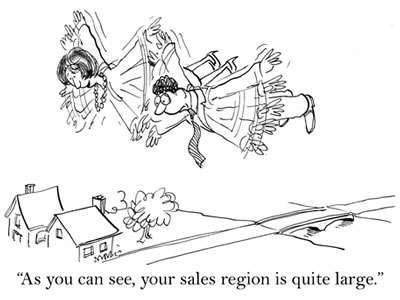Managing Sales Territories
Many years ago, I used to work in office automation sales. I had a sales territory to manage, and most of the day was spent going into companies, seeing what type of equipment they were using in terms of copiers/printers/faxes etc., and start to talk to them about changing.
I went into a company that was using some very old equipment, and my timing was brilliant. They were looking to update, and it looked to be a very good deal. Within 24 hours, my hopes were dashed. They had a second, much smaller office, in another location (also in my territory), which had one of our products already, an old, tiny fax machine.
That meant that they were an existing customer, so rather than being new business, was considered an existing account, and we had a separate team that looked after existing business, so would not be my deal. What should have then happened was that my manager at the time (for new business) should have passed the lead over to the manager of existing accounts, who could get one of their guys to take over.

However, due to various reasons, probably competitiveness between the two managers, that lead was never passed over, and the company never won the deal. The client went elsewhere. It seemed that quite a bit of that happened, and the biggest loser was the company itself. For that reason, I left the company soon after to go to a company that managed its team in a different way.
It is about 10 years since that happened though, and in that time, I have often thought about, and been asked, what is the best way to
manage sales territories? The truth is that there is no one best way. It needs to be tied to your industry, your product, and it must be linked to your overall sales strategy. The key is to understand what you hope to achieve, and choose the best or most appropriate, or a combination of some.
What is Your Sales Strategy?
Here are some strategies to consider.
- Geographically. Salespeople can be given a specific geographic area to manage, and all the companies based therein.
- Alphabetically. Salespeople could be responsible for companies starting with a range of letters e.g. A-I, another person looks after J-S and so on.
- By customer type. You can have some people looking after private individuals, SMEs, corporate accounts etc.
- New vs. existing. Some people might look after existing clients, others look to bring in new accounts.
- Product types. You can have people that specialise in different products. This becomes more useful as the product becomes more technical and complicated.
- Inbound vs. outbound. You can have some people actively looking for new business, while others manage incoming leads that you generate from any advertising etc.
- Combinations of one or more. As in my example above, we had people looking after new and existing accounts, and the new business salespeople had geographic areas.
This is not a complete list. If your strategy is to primarily spend a lot on advertising, and then run a call centre for incoming calls/leads, you might not need to manage territories at all, just manage the team as they receive calls. However, it will be a list that many companies will recognise, as they will do parts of.

Regardless of which one you use, I do feel that there are certain areas to consider. One is that whichever you use, be flexible enough to change if necessary. Your industry might undergo a change. You might have a change of sales strategy, and decide to advertise more, or less. And with so many companies restructuring, and changing these days, it could happen to you more often than you think.
The second thing to consider is that whichever strategy you do adopt, ensure that there are no gaps that things can slip through. As in the example above, passing leads over to a competing team was not something that people wanted to do, and the company lost out. You want to avoid that type of situation.
A third thing to do is to ensure that you run regular territory reviews. If you are not doing reviews, you are not going to see if you need to change or not, or make any small adjustments. For example, you might use a geographic strategy, and want to keep that, but just change the actual territory boundaries.
How to Improve Your Sales Strategy?
So, do you want to avoid the type of situation that I encountered at the office automation company, and stop losing potential deals through the way in which you manage your sales territories? Perhaps it is time to review the way that you
manage your territories, or even the whole strategy that the territories are based on. If you are looking for some new possible ideas, or maybe you have been promoted to sales manager because of your own good sales, and never received formal training, why not look into something that can provide those ideas? If you do have the knowledge, with so many industries changing so quickly, is there a better time to look at this than now?
What do you think? Let us know what you think in the comments below.

If you'd like to learn more about selling skills, why not take a look at how we can help?
Boost your sales skills with our online courses.
RRP from $39 – limited time offer just $12.99



























